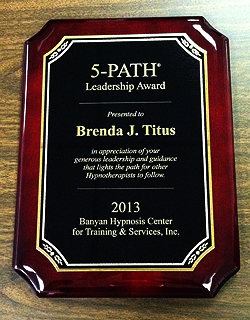By Brenda Titus
Part 4 in a 4-part series
This blog series has focused on ways that teens and their families can benefit by working with a hypnosis professional. This is a unique age group with challenges that are specific to their developmental stage. I began the series with a broad look at some of the special considerations hypnotists need to address when working with this population. In parts 2 and 3, I focused on special needs of middle school and high school clients respectively. In this edition, I will discuss one of the most important variables that will lead to success with your teen clients- their parents. In this discussion, I will present tools and techniques so that you can maximize your clients success through your interactions with their parents.
One of the most important factors that leads to overall success in our clients is the implementation of change in between sessions. Whether the teen is seeing a hypnotist to improve test scores, confidence or sports performance, or some other behavioral change, the client and those around him or her will be looking for signs that they are making the changes that they came to the hypnotist to make. As the client begins to show improvement, how their parents react to this change will greatly impact future sessions and ongoing success of the hypnotic intervention. Because the parents are such an important part of your intervention with the teen, it is vital to build rapport with them so that you understand what they expect and so that they trust you and your process, which will ensure that they will not undermine the work being done. This rapport building begins during the initial contact and shifts and changes throughout your work with the teen.
Building Rapport and Setting Expectations
Since the parents have such a great influence on the outcome of your sessions, it is necessary to build rapport with them during the initial contact and at the first session. While they are not the client and they will not be the person who is making the change, they have an enormous amount of impact on whether the client will follow through with the changes. If the teen returns home and is supported and acknowledged for the changes that he or she is making, then the sessions and the changes will be positively reinforced. If the parent undermines the power of the work by minimizing it or pointing out ways that the teen is not making the change, this can lead to setbacks in the teen.
It is important to get a clear understanding from the parent about what anticipated change in the teen looks like to them and what their expectations are in terms of timing of improvement. I explain to parents that the work I will be doing is a process, and there should be noticeable improvements every session. Having concrete examples of expected behavior change that the parents will be able to witness between sessions will help them positively reinforce the behavioral change, which will give the teen motivation to continue the process and make their changes permanent.
During the initial consultation, it is valuable to get an idea of how the parent communicates with the teen, how they nurture and support, and how they correct or punish undesirable behavior. This will help you have a better understanding of how the parent will react to the changes that the teen will be making in session. I like to bring both the teen and parent in to talk to me about the nature of the issue, and observe their interactions at this point. Since I have usually already heard the parent’s thoughts about the problem or issue over the phone, I ask again in person, and then observe the teen’s reactions as the parent relays the information to me. I observe the parent’s reactions as the teen shares their thoughts about the issue. I occasionally ask further questions that will help me understand how the family functions in terms of nurturing and support as well as punishment. Once the parent leaves the room, I will ask the teen if they have anything that they would like to share with me now that we are on our own to help me understand the issue. This is just as important a step as any, because it indicates the nature of the relationship and helps me understand how the teen anticipates their parents will react to their changes. If the teen does not expect to be supported in the changes that they are making, it is important to know so that the hypnotist can find a good motivating factor to get the teen engaged right from the beginning.
It is helpful for the hypnotist to explain to the parents the techniques that will be used and how they will help the teen. This does not require a lot of detailed information, however it will put the parent’s mind at ease about the sessions and the work being done. When explaining techniques, it is important to maintain client confidentiality. I will often give examples of how various techniques can be helpful without using information that the teen client has given me without the parent present.
Reinforcement Between Sessions
Once you begin working with your teen clients, you want to be sure that they have the opportunity to show their parents right away how the sessions positively impact their behavior. You also want to be sure that they are able to understand and explain what they are learning and how they are changing in sessions. The goal is that their parents will support and acknowledge the work that they are doing with you, which will continue to reinforce the behavioral change.
Using Age Progression is a great way to help a client reinforce their expectation that the changes that you work on in session can be translated into their regular everyday lives. By taking them into the future, they are reminded of how good it will feel when they have not only made the change but have lived a happy, successful life because of it. I will usually make sure that I know of some specific events that will take place between sessions where the client can test their new skills. This will give them an immediate opportunity to reinforce their work and get positive reinforcement from their parents, which will continue to motivate them as we continue our process.
As I close out each session with my teen clients, I talk to them about what they would like to share with their parents about the session. When they explain what they have learned about themselves and their behavior to their parents, it reinforces the belief in their ability to overcome the problem and makes it easier for them to follow through. This also gives the parents an understanding of how the teen is changing, based on the teens own insights. Together you might want to identify words or phrases to reinforce or validate the new behavior. It is important to maintain confidentiality when reporting back to the parents about the sessions. I usually explain the goal or purpose of the session, the technique involved in achieving that goal, and then I have the teen share what they learned about themselves during the session. This way they can share as much or as little as they choose. Together we share with the parents how the teen will use their new skills in the coming week, based on their Age Progression, and we will discuss how they expect this to reinforce their ongoing improvement. By taking this time together, the parents are able to see the big picture of the work being done and they will be able to give positive reinforcement to the changes being made.
It is important to talk to your teen clients about how they expect their parents to react to their behavioral changes and what they can do with the reaction so that the progress that they are making in session does not become undermined between sessions. I have worked teens who did not expect their parents to react positively to the progress they were making during our sessions. After witnessing the teens report back to their parents and seeing the reaction, I realized that a small portion of parents might not positively reinforce the behavioral change. For teens who are in a situation like this, I work with them on being the boss of their own reactions. We discuss the fact that mom and dad make the rules at home, the teachers make the rules at school, and if they have jobs, the boss gets to make the rules there. There is one place that the client gets to be the boss in their lives, and that is in how they act. We also put emphasis into the long-term future where they can be the boss of their lives without mom and dad being a factor. I’ll usually remind them that the best way to get to that future is to actually follow through on the goals of their sessions. Understanding that the client may not receive the nurturing support and positive reinforcement at home to change their behavior, it is vital to help them learn how to reinforce it for themselves.
Ongoing Reinforcement
When you conclude your sessions with your teen clients, it is important to provide them with some tools so that they will continue to reinforce the positive changes that they have made and so that they will know what to do if they need help in the future.
Age Progression is one of my favorite tools for ongoing reinforcement, especially for teen clients. While it is important for them to progress into the near future during sessions so that they can practice their behavioral changes between sessions, it is also valuable to do Age Progression much further into the future. Depending on the kind of work that you have done together, this could be a year into the future, or several years into the future. If I know that the teen is focused on school and career, I will progress them into the future in stages with these goals in mind. If we are working on confidence or relationship issues, I might progress them to future relationships. The sky is the limit, and your suggestions for Age Progression will be based on the work that you have done with the teens. By giving them incremental progressions, your work is reinforced at each step of the way in their future.
As with any clients, teens may need a reinforcement session in the future, or other issues may come up to be addressed. Make sure that the parents and the teen know that you are just a phone call away and they can come back to see you for more work. I always remind parents of all of the issues that I work on, and that even though I saw their teen for sports performance, they should keep me in mind if relationship issues come up in the future. I try my best to use an example based on the work that I did with the teen, as it plants a seed for them to remember later on if anything does need to be addressed.
For some teens, the best way for their sessions to be positively reinforced will be for their parents to also receive sessions. This is true for many of our clients, however for teens this is especially true. When our clients start changing, those around them have the power to reinforce the change or to reinforce the problem behavior. Teens are on the brink of being adults but are still dependent on their parents for so many things. Helping the parents ease their own emotional distress will help them be more tolerant and understanding of their teen and will help them reinforce the teen’s changes in a positive way.
Conclusion
The teen years are a time of great change and great potential. The future is in their hands, and it is in their power to create a great future or to get stuck in patterns that will take years to undo. Working with teens is very rewarding, but challenging. I hope that you have enjoyed this series on working with teens in your hypnosis practice. It has been a pleasure writing it and learning and growing through the examples that I have provided throughout the series.










